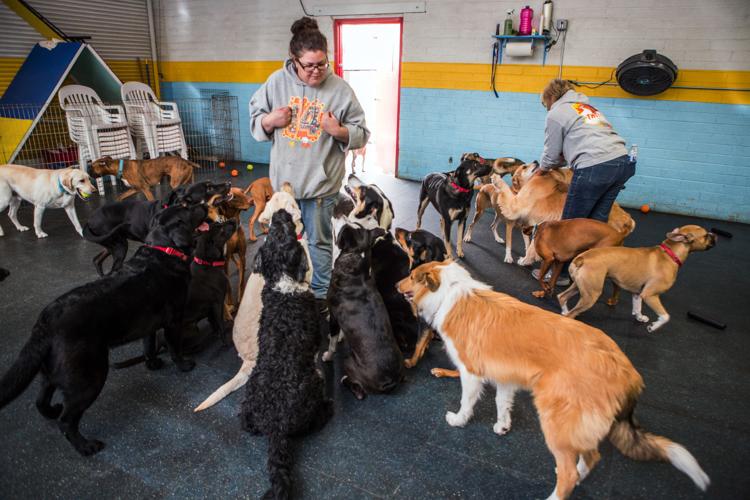Janet Galante had planned to provide health benefits to her staff at Tucson-based Sit Stay Play dog daycare next year.
But new expenses stemming from Arizona’s impending minimum-wage increase, which goes into effect Jan. 1, will make that impossible, she said.
While her employees all make more than minimum wage, Galante said she’ll have to give across-the-board increases to her longtime employees, so they don’t end up earning less than those hired under the new standard.
“Why would I want to risk alienating those people and losing them?” she said. “It would be bad business, and it’s also just not fair.”
Businesses across the state are grappling with the anticipated costs and ripple effects of Proposition 206, which will raise Arizona’s current $8.05-per-hour minimum wage to $10 in 2017, and to $12 by 2020. Under the law, more than 700,000 Arizonans will get a raise starting this year.
The ballot measure, approved by 58 percent of voters in November, also mandates at least three days of paid sick leave annually, starting in July.
On Thursday, the Arizona Supreme Court rejected an effort, led by the Arizona Chamber of Commerce and Industry, to delay implementation of the pay increase. The justices will likely hear arguments in February from opponents fighting the new law.
At Shlomo & Vito’s deli, owner Dean Greenberg said it’s likely he will have to shut down the Catalina Foothills restaurant because of Prop. 206, although he noted the business was already struggling with debt. He’s making cuts that he hopes will keep the deli afloat.
“We’re making some drastic changes,” he said. He’s cutting 10 people from his 43-person staff and has scaled down the deli menu to minimize prep work.
From a social point of view, Greenberg said he supports the idea of a living wage. But as a businessman, he said he can’t raise his prices enough to offset the losses resulting from Prop. 206, including higher charges from his food purveyors.
Greenberg, also president of Greenberg Financial Group, said he makes a point to hire workers who need a second chance, like those with a criminal record or a history of addiction. But those employees should earn their raises over time, as they gain skills and experience, he said.
“There’s a reason they’re making $8 an hour,” he said. “They’re not worth 12 bucks an hour.”
SUPPORT FOR PROP. 206
But some Tucson businesses fully endorse the minimum-wage boost, even if it causes financial strain.
“It’s going to cost me more to pay my employees, but that’s a kind of business and ethical sacrifice that you have to be willing to make, if you’re looking at the big picture,” said Robert Hall, 36, owner of Generation Cool, which sells vintage clothing and collectibles on North Fourth Avenue. “My principles on bettering the community, and our society at large, definitely outweighed the potential negative risks. I tend to look at what’s better for human beings.”
Hall said he remembers all too well what it was like working minimum-wage jobs in his 20s.
“There were times when I felt there were things I needed that I couldn’t afford, basic necessities, and that was a scary feeling,” he said.
Across Arizona, 450 businesses supported Prop. 206, said Zaira Livier, who coordinated the Southern Arizona campaign for the ballot measure.
“Especially in south-side Tucson, the businesses there didn’t blink an eye when I would approach them,” she said. “They know if people have more money in their pockets, their business is going to do much better because they cater to the working class. It was a really easy sell.”
Businesses opposed to the new minimum wage should question why their business model is predicated upon low pay, said Hall, who has five employees whose pay will be affected by Prop. 206. Hall said he’s cut his budget in other areas to offset some of his additional labor costs, and he hopes a boost in revenue from customers with more cash will balance out the rest.
“I’m optimistic that people making more money equals people spending more money,” he said.
Galante of the dog-sitting business said it’s harder for some industries to cut expenses: Her agency must meet staffing requirements for the safety of the animals, so she can’t cut jobs, and she can only increase prices so much before alienating customers, she said.
Galante doesn’t know how she’ll offset an expected $100,000 in additional expenses in 2017, resulting from increased payroll costs and the paid sick-leave required under Prop. 206, she said.
“It’s a gigantic hit,” she said. “We’re small. We don’t have other components of business to absorb this hit like they do at PetSmart or some of the corporate franchise places.”
“A MATTER OF CONSCIENCE”
The minimum-wage increase will be a huge adjustment for landscaping companies that don’t yet pay their workers a living wage, said Sandra Sigmon McBride, owner of McBride Landscaping and Yard Maintenance.
But she’s not one of them. McBride, who voted for Prop. 206, said she has always paid her employees more than minimum wage, usually between $11 or $12 for those with experience. She’ll likely give everyone a raise this year to ensure that remains the case, she said.
“If it becomes a problem where I have to raise prices, then I’ll raise prices,” McBride said. “If some customers don’t want to pay me more for the great work we do, then I don’t need those customers, frankly.”
Her business has operated in Tucson since 1989 and today employs eight people who primarily do yard-maintenance work: raking, mowing, weeding and tree-trimming.
“My guys work hard for their money,” she said. “I couldn’t in good conscience not pay my employees at least enough to get by on.”
IMPACT HARD TO PREDICT
Robert Medler, vice president for government affairs at the Tucson Metro Chamber, said minimum-wage increases do exceptionally well on ballots, but many businesses weren’t planning for such a big jump in the rate.
“I fully expect to hear more from businesses in January after they have had to comply and they see the actual, on-the-ground effects of a significantly higher minimum wage,” Medler said.
The Tucson Metro Chamber fought the minimum-wage update, called the Fair Wages and Healthy Families Act, citing the potential for higher product prices, reduced staff hours and layoffs, and diminished appeal to businesses looking to expand into Arizona.
George Hammond, economist at the University of Arizona’s Eller College of Management, said research on the effects of minimum-wage increases across the nation has found the increases “tend to have small but negative impacts on employment of teens and low-skilled workers.” He was citing a 2015 article by a San Francisco economist that summarized much of the research.
But past research has mostly focused on smaller wage increases than Arizona’s, he said.
“It’s not clear what the impacts will be in Arizona. We’ll have to wait and see,” he said.
On the plus side, industries that rely on minimum-wage employees typically have to deal with high turnover rates, which can be costly, Hammond said. Higher wages could mean better employee retention, he said.
“If the higher minimum wage means less turnover ... it’s possible it will offset, at least partially, the fact that increasing the minimum-wage increases costs,” he said.
Nearly 90 percent of people who will benefit from the minimum-wage increase will be over age 20, said an independent analysis from the Grand Canyon Institute. The study estimates 13,000 Arizonans could lose their jobs as employers try to cut costs in response to the increase, but 790,000 people would benefit from higher pay.
Justin Oldaker, CEO of By Your Side Senior Care, said he worries the higher minimum wage could prompt caregivers in the industry to opt for easier, less-intensive minimum-wage jobs that will now offer more-competitive wages.
“We already have a shortage of caregivers,” he said. “So we’re very concerned with the new changes.”
Oldaker said he already lost 10 percent of his client base who said they couldn’t absorb the higher rates he’s had to implement in response to Prop. 206. Oldaker also fears clients may turn to unlicensed, independent contractors in search of cheaper care.
“They’re going to hire individuals off of Craigslist so they can pay less,” he said. “We’re taking an already vulnerable part of society and increasing that vulnerability.”
SHOP LOCAL
Amanda Tobak is the owner of Industrial Chemical of Arizona, which has sold cleaning and facility maintenance supplies residentially and commercially since 1977.
Most of her customers are mom-and-pop cleaning or finishing businesses who pay many of their entry-level employees minimum wage, she said. Many are already eliminating part-time jobs in response to Prop. 206, and she worries she’ll lose business as her clients struggle to cope with the increase, she said.
Tobak said she’ll have to start reducing benefits for employees if she sees fewer customers. But she says one of the best ways to combat any negative effects of Prop. 206 is for consumers to spend their dollars at small, local businesses before shopping at big chain stores.
“I would really urge Arizona consumers to think of local first,” she said.






